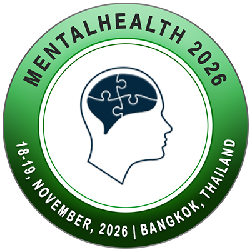Track: Stress, Anxiety and Depression

“Understanding and Managing Stress, Anxiety, and Depression: Strategies for Mental Well-Being”
Agoraphobia
Agoraphobia is an anxiety disorder characterized by intense fear and avoidance of places or situations where escape may be difficult or help unavailable during a panic attack. Participants will gain an understanding of the symptoms, diagnostic criteria, and the impact of agoraphobia on daily life. Treatment strategies, such as cognitive-behavioral therapy (CBT) with exposure therapy, pharmacotherapy, and approaches for supporting individuals with agoraphobia, will be covered.
Hopeless Outlook
A pervasive sense of hopelessness, often associated with depression, can negatively affect mental health and exacerbate depressive symptoms. Cognitive restructuring and interventions aimed at fostering hope and resilience will be explored as therapeutic approaches to counteract hopelessness and improve emotional well-being.
Increased Fatigue and Sleep Problems
Mental health conditions like depression and anxiety often disrupt sleep patterns and contribute to increased fatigue. Strategies for managing sleep disturbances and fatigue, including cognitive-behavioral therapy for insomnia (CBT-I), lifestyle changes, and pharmacological interventions, will be discussed.
Generalized Anxiety Disorder (GAD)
Generalized Anxiety Disorder (GAD) involves excessive and uncontrollable worry about various life aspects. Symptoms, diagnostic criteria, and the effects of GAD on daily functioning will be explored, alongside treatment options like CBT, medications, and relaxation techniques for managing chronic anxiety.
Persistent Depressive Disorder (Dysthymia)
Persistent Depressive Disorder (formerly Dysthymia) is a chronic form of depression with long-term, mild depressive symptoms. Attendees will learn about diagnostic criteria, symptoms, and the impact of dysthymia, as well as treatment options, including psychotherapy, medications, and lifestyle modifications to alleviate persistent depressive symptoms.
Panic Disorder
Panic Disorder is marked by recurrent and unexpected panic attacks. Symptoms, triggers, and the impact of panic attacks on daily life will be explored, along with effective treatment strategies such as CBT, exposure therapy, and medications to help individuals manage and reduce panic attacks.
Obsessive-Compulsive Disorder (OCD)
Obsessive-Compulsive Disorder (OCD) involves intrusive thoughts (obsessions) and repetitive behaviors (compulsions). Diagnostic criteria, the impact of OCD on daily life, and evidence-based treatments like CBT with exposure and response prevention (ERP) will be examined, alongside strategies for managing OCD symptoms and improving functioning.
Trauma and Post-Traumatic Stress Disorder (PTSD)
Trauma and Post-Traumatic Stress Disorder (PTSD) significantly affect mental health. Symptoms such as flashbacks, nightmares, and hypervigilance will be discussed, along with treatment approaches like trauma-focused therapy and Eye Movement Desensitization and Reprocessing (EMDR). Strategies for supporting individuals with PTSD will also be covered.
Scientific Highlights
- Mental Health
- Women’s Mental Health
- Psychology and Psychiatry
- Autism
- Stress, Anxiety and Depression
- Psychotherapy and Counseling Psychology
- Behavioral Health and Bullying
- Suicide and Self Harm
- Bipolar Disorder
- Schizophrenia
- Neurology and Neurological Disorder
- Addiction
- Obesity and Eating Disorder
- Child and Adolescent Psychiatry
- Obsessive Compulsive disorder
- Post-Traumatic Stress Disorder
- Personality Disorder
- Child Abuse
- Legal and Ethical Issues in Clinical Research


